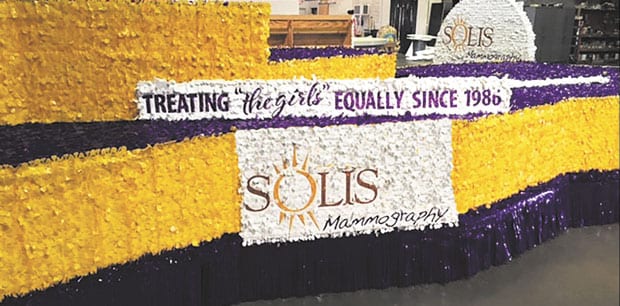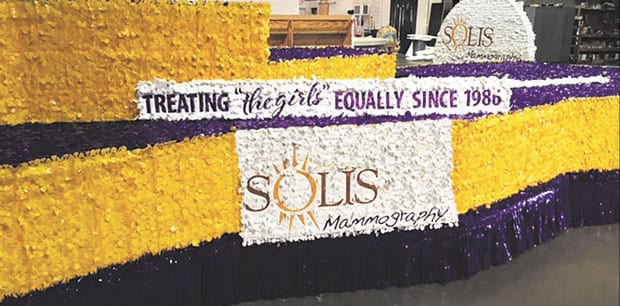Solis Mammography wants to bring its message encouraging regular check-ups to the LGBT community

Watch for the Solis float in the Alan Ross Texas Freedom Parade on Sunday.
DAVID TAFFET | Senior Staff Writer
Solis Mammography is sponsoring a float in the Alan Ross Texas Freedom Parade in an attempt to bring greater breast cancer awareness to the lesbian community.
James Polfreman, CEO of Solis Mammography, said he attended last year’s Pride parade with his now-fiancé. He was impressed by the energy and enthusiasm of the crowd, and noted the large number of women there. And as an advocate for equal rights, he suggested participating in this year’s parade as an opportunity to showcase the importance of breast health to women in the LGBT community.
“No woman really wants to get a mammogram; what women want is to know that they are healthy and all clear for another year,” Polfreman said. “We know, however, that for those who find an abnormality [and are] in need of treatment, the earlier she detects it, the better her treatment options are — including potentially minimizing or eliminating the more invasive treatments.”
Lesbians tend to have a higher risk of breast cancer, possibly because they’re less likely to have had a pregnancy, to have breastfed or to use birth control. In addition, obesity, smoking and alcohol abuse that affect some lesbians are additional factors increasing the risk of breast cancer.
About 230,000 women were diagnosed with breast cancer in 2015. Of those, 50,000 were women under the age of 50.
For people with insurance, mammograms are fully covered for women over 40. Under the Affordable Care Act, mammograms should be free with insurance regardless of deductible and with no co-pay. However, only 51 percent of women with insurance take advantage of this benefit, according to the Susan G. Komen Foundation.
The earlier breast cancer is diagnosed, the better the treatment options available. The average size of an anomaly when found in a woman who gets regular annual mammograms is the size of a pea, while the average size of a breast anomaly found by a woman doing self-breast exams is the size of a walnut.
Lesbians are less likely to have health insurance, according to the American Cancer Society. In addition, research shows that those lesbians who do have insurance still avoid mammograms because of fear of discrimination if they reveal their sexual orientation to a healthcare provider or because they have actually had negative experiences with doctors.
Breast cancer occurs slightly more frequently among white women than among black women, but the mortality rate is higher for black women. Breast cancer is more common among Jewish women of eastern and central European origin (Ashkenazic Jews), probably because of the presence of BRCA1 and BRCA2 gene mutations. Breast cancer occurs less frequently among Hispanic women, who also have a lower mortality rate, but it still remains the leading cause of cancer death for this group.
The Susan G. Komen Foundation does offer some encouraging statistics: The mortality rate from breast cancer decreased by 37 percent from 1990 to 2013. This is probably due to early detection and improved treatment.
Solis Mammography is a network of breast screening and diagnostic centers, based in Addison and with 21 locations in North Texas, and 31 centers total in four states. The company prides itself on “delivering exceptional patient care and peace of mind in breast health,” according to the Solis website.
“The specialized radiologists with whom we work are focused exclusively on providing the very best in breast screening and diagnostics,” the website notes. “Solis has instituted the use of several innovative technologies to help facilitate patient engagement at key touchpoints, including scheduling, registration and the prompt delivery of results. We understand that a breast exam can be an anxious time for a woman, which is why we strive to make our patients as comfortable and relaxed as possible before, during and after their visit.”
The company first began 30 years ago when Dr. Timothy Freer opened the first Women’s Diagnostic Center. The company grew quickly to five locations across the Dallas-Fort Worth Metroplex, and “with the goal of bringing this same level of patient-focused care to a larger population, our business name evolved in 2005 to the Solis brand.”Solis has since grown to 31 locations in four states, with 21 of those locations here in North Texas. •
This article appeared in the Dallas Voice print edition September 16, 2016.

